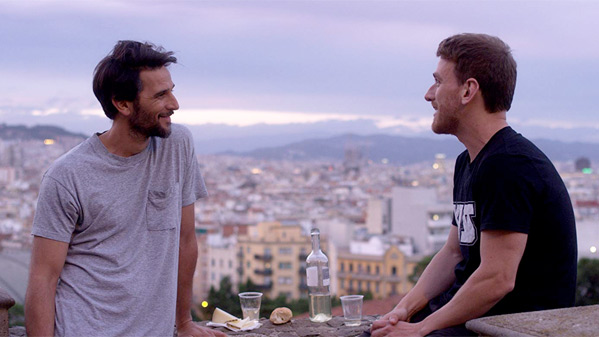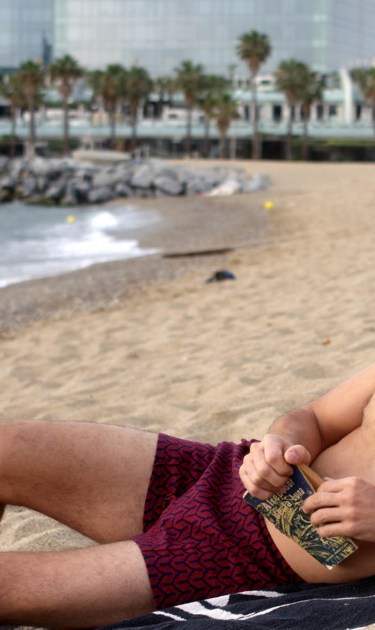The dream logic that governs Lucio Castro’s feature film debut Fin de siglo (End of the Century) is hard to pin down. That’s because, on first look, there is nothing unreal about what we’re watching in this languid decades-spanning love story. Ocho, a young Argentine man (Juan Barberini) is on holiday in Barcelona. He’s a bit adrift, leisurely taking in the streets of the Spanish city. That is, until Javi (Ramon Pujol) catches his eye. Their coy flirtation at the beach eventually leads them to the apartment Ocho is staying at. The sex and the intimacy that follows has you believe we’re watching yet another entry in the Before Sunrise canon, a Spain-set Weekend of sorts. Except during a conversation later, as they share drinks in a picture-perfect rooftop, Javi reveals something that will upend everything you thought you knew about their one-night stand: they’ve met before.
Just like that, the film flashes back to their initial meeting years ago. We turn back time to before Ocho had even come out or started dating the guy who he’d been with for 20 years, before the breakup that preceded his Barcelona trip. Even so, Castro’s decision to change very little about his leading men’s appearances — no de-aging, no discernible youthful looks — alerts you that this is not you ordinary film. Later still, Castro offers audiences yet another time shift which further destabilizes any semblance of linear chronology. This shuffling of time feels not so much disorienting as dreamlike.
By the time the credits roll, you’re left with a number of timelines that don’t add up and no clear sense of what’s real, what was imagined, what was a dream, and what may well have been an alternate history for these two men. The two speak of partners they had, of cities they’ve lived in, of kids they’re raising, but what we see in the Barcelona apartment seems to mix them all together. “I had a dream that I was with someone for 20 years, but it wasn’t you,” Ocho tells Javi at one point. Given everything you see, it’s unclear whether he’s revealing the film’s secret or obscuring it further — but, it doesn’t matter.

Castro’s film — shot in a naturalistic style with nothing but the sounds of bustling Barcelona to score Ocho and Javi’s encounters — is about the changing face of gay male intimacy. Rather than force us to be invested in their pasts or their futures (will they or won’t they?), their various conversations and hookups add up to something else entirely; talk of open relationships, of newfound sexual desires, of child-rearing, and heartbreak all commingle together. The out-of-time-ness of the film’s overlapping stories just highlights how many different and equally valid variations of same-sex intimacy can exist at any given time. In the several permutations we see of Ocho and Javi, we see very different versions of them: they’re horny, drunken guys whose attraction is as fiery as it is shameful; they’re nameless hookups relishing the freedom of their desires run amok; they’re committed parents who’ve found comfort, if not sex, in their shared bed.
With a tender and lustful gaze sustained over long, panning shots that showcase Barcelona’s beauty, Castro makes his central couple a prism through which to think about how love and intimacy shift shape in long term relationships. “I was tired of being jealous of people who had complete freedom,” Ocho tells Javi, explaining his recent breakup while up at the rooftop. He yearns to be alone; yet, he also craves the company of this Spanish man wearing that Kiss shirt that looks all too familiar. The new and the familiar are constantly being shuffled in this dreamy film. Juxtaposing those uncomfortable conversations about what it means to make a life with another, fearful of what that does to your individuality, to your sexual urges, and to your sense of self. With idyllic scenarios of the welcome beauty of finding someone who wants you, Fin de siglo is a gorgeous examination of what 21st century relationships can look like.
Fin de siglo screened as part of New Directors/New Films program.




